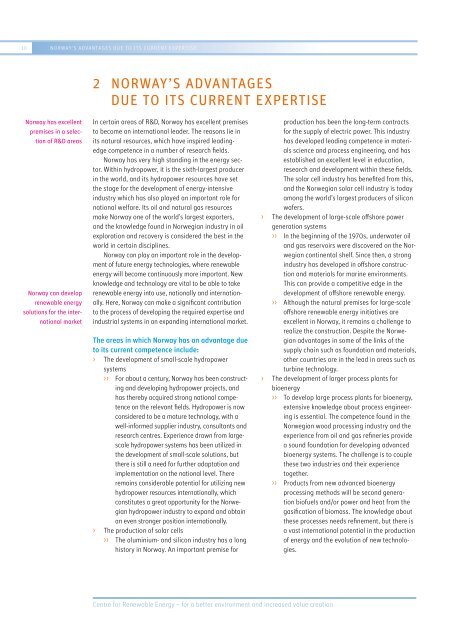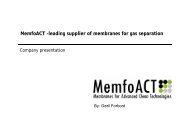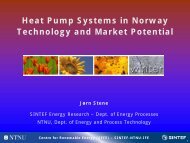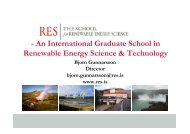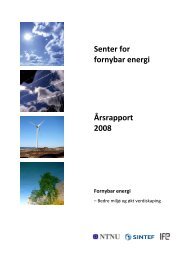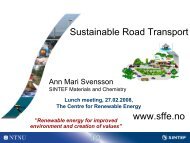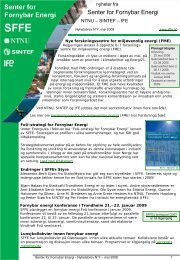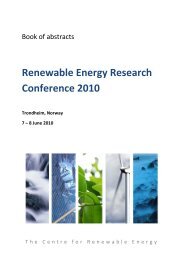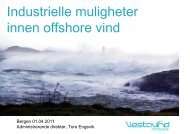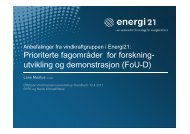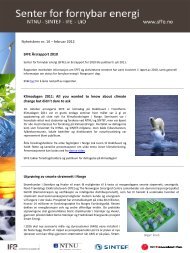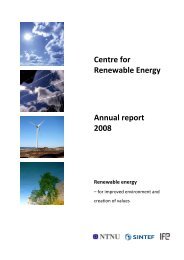R&D Strategy for Renewable Energy - SFFE
R&D Strategy for Renewable Energy - SFFE
R&D Strategy for Renewable Energy - SFFE
Create successful ePaper yourself
Turn your PDF publications into a flip-book with our unique Google optimized e-Paper software.
10 Norway’s advantages due to its current expertise<br />
Kapitteltekst<br />
Framework conditions <strong>for</strong> R&D and commercialization 11<br />
2 Norway’s advantages<br />
due to its current expertise<br />
3 Framework conditions<br />
<strong>for</strong> R&D and commercialization<br />
Norway has excellent<br />
premises in a selection<br />
of R&D areas<br />
Norway can develop<br />
renewable energy<br />
solutions <strong>for</strong> the international<br />
market<br />
In certain areas of R&D, Norway has excellent premises<br />
to become an international leader. The reasons lie in<br />
its natural resources, which have inspired leadingedge<br />
competence in a number of research fields.<br />
Norway has very high standing in the energy sector.<br />
Within hydropower, it is the sixth-largest producer<br />
in the world, and its hydropower resources have set<br />
the stage <strong>for</strong> the development of energy-intensive<br />
industry which has also played an important role <strong>for</strong><br />
national welfare. Its oil and natural gas resources<br />
make Norway one of the world’s largest exporters,<br />
and the knowledge found in Norwegian industry in oil<br />
exploration and recovery is considered the best in the<br />
world in certain disciplines.<br />
Norway can play an important role in the development<br />
of future energy technologies, where renewable<br />
energy will become continuously more important. New<br />
knowledge and technology are vital to be able to take<br />
renewable energy into use, nationally and internationally.<br />
Here, Norway can make a significant contribution<br />
to the process of developing the required expertise and<br />
industrial systems in an expanding international market.<br />
The areas in which Norway has an advantage due<br />
to its current competence include:<br />
› The development of small-scale hydropower<br />
systems<br />
›› For about a century, Norway has been constructing<br />
and developing hydropower projects, and<br />
has thereby acquired strong national competence<br />
on the relevant fields. Hydropower is now<br />
considered to be a mature technology, with a<br />
well-in<strong>for</strong>med supplier industry, consultants and<br />
research centres. Experience drawn from largescale<br />
hydropower systems has been utilized in<br />
the development of small-scale solutions, but<br />
there is still a need <strong>for</strong> further adaptation and<br />
implementation on the national level. There<br />
remains considerable potential <strong>for</strong> utilizing new<br />
hydropower resources internationally, which<br />
constitutes a great opportunity <strong>for</strong> the Norwegian<br />
hydropower industry to expand and obtain<br />
an even stronger position internationally.<br />
› The production of solar cells<br />
›› The aluminium- and silicon industry has a long<br />
history in Norway. An important premise <strong>for</strong><br />
production has been the long-term contracts<br />
<strong>for</strong> the supply of electric power. This industry<br />
has developed leading competence in materials<br />
science and process engineering, and has<br />
established an excellent level in education,<br />
research and development within these fields.<br />
The solar cell industry has benefited from this,<br />
and the Norwegian solar cell industry is today<br />
among the world’s largest producers of silicon<br />
wafers.<br />
› The development of large-scale offshore power<br />
generation systems<br />
›› In the beginning of the 1970s, underwater oil<br />
and gas reservoirs were discovered on the Norwegian<br />
continental shelf. Since then, a strong<br />
industry has developed in offshore construction<br />
and materials <strong>for</strong> marine environments.<br />
This can provide a competitive edge in the<br />
development of offshore renewable energy.<br />
›› Although the natural premises <strong>for</strong> large-scale<br />
offshore renewable energy initiatives are<br />
excellent in Norway, it remains a challenge to<br />
realize the construction. Despite the Norwegian<br />
advantages in some of the links of the<br />
supply chain such as foundation and materials,<br />
other countries are in the lead in areas such as<br />
turbine technology.<br />
› The development of larger process plants <strong>for</strong><br />
bioenergy<br />
›› To develop large process plants <strong>for</strong> bioenergy,<br />
extensive knowledge about process engineering<br />
is essential. The competence found in the<br />
Norwegian wood processing industry and the<br />
experience from oil and gas refineries provide<br />
a sound foundation <strong>for</strong> developing advanced<br />
bioenergy systems. The challenge is to couple<br />
these two industries and their experience<br />
together.<br />
›› Products from new advanced bioenergy<br />
processing methods will be second generation<br />
biofuels and/or power and heat from the<br />
gasification of biomass. The knowledge about<br />
these processes needs refinement, but there is<br />
a vast international potential in the production<br />
of energy and the evolution of new technologies.<br />
<strong>Energy</strong> is a vital resource in the modern community.<br />
Thus it is a challenging task to manage the production<br />
and consumption of energy, and at the same time<br />
to fulfil the broad range of human needs in order to<br />
maintain the sustainability of our society. To meet this<br />
challenge, new strategies are required in politics, the<br />
economy, technology and everyday life. Global warming<br />
and the need to reduce the emissions of CO2 and<br />
other greenhouse gases have intensified the focus on<br />
energy production and consumption. We need new solutions,<br />
and a modern society should act with a certain<br />
level of critical awareness regarding the management<br />
of energy and evaluate the possibilities of the future.<br />
This evaluation should include insight from social<br />
sciences and the humanities. This knowledge can<br />
play a role in bridging the gap between technologists,<br />
economists and society.<br />
In order to strengthen initiatives in renewable energy<br />
in Norway, these problems should become more<br />
important matters of discussion between the country’s<br />
decision-makers.<br />
Framework conditions<br />
It is possible to create Norwegian companies with<br />
expertise that deliver know-how to Norway and the<br />
international market.<br />
This could include:<br />
› Innovations in the national construction of renewable<br />
energy facilities such as wind turbines, bioenergy<br />
and energy-efficient buildings.<br />
› Export-led innovation, such as the solar cell industry.<br />
If the creation of industrial and commercial development<br />
in Norway is to be a viable proposition, it is<br />
essential to take the entire value chain into consideration;<br />
from research to industry’s framework conditions.<br />
Changes in the energy sector suggest investments<br />
in the infrastructure that are of importance to the<br />
entire structure of the society. The international renewable<br />
energy market is mainly controlled by politics,<br />
through instruments like investments in R&D and feedin<br />
tariffs. A politically controlled planned development<br />
of new energy technologies gives the opportunity <strong>for</strong><br />
long-term planning. Thereby profit can be made by<br />
developing technologies and eventually implementing<br />
mass production.<br />
There is global competition between countries to attract<br />
companies in energy and environmental technology.<br />
Among others, Japan and Germany have realized<br />
large initiatives to attract companies so as to phase in<br />
renewable energy. As a result, Japan has become the<br />
world leader in the solar cell industry and Germany<br />
in solar heat utilization, biofuels and windpower. The<br />
Norwegian solar cell industry is among those that benefit<br />
from these framework conditions from elsewhere.<br />
Reliable framework conditions are necessary <strong>for</strong><br />
research and industrial development. Government<br />
investments in R&D are important to realize alternative<br />
energy solutions, and it has been seen so far that<br />
Norway is far behind its neighbouring countries, as<br />
well as many other countries in the EU.<br />
The conditions <strong>for</strong> the testing of new technology<br />
are equally important. Norway’s conditions in this<br />
respect are to date (2008) not competitive. The feed-in<br />
tariffs must be sufficient to attract the industry; it is<br />
not enough that the investment is considered “marginally<br />
profitable”. If the conditions are better in neighbouring<br />
countries, there is a clear risk of the leakage<br />
of technology. The Norwegian media has frequently<br />
reported about Norwegian companies moving prototypes<br />
and demonstration projects to other countries<br />
such as Germany, England and Portugal, where the<br />
conditions are better.<br />
Million €<br />
140<br />
120<br />
100<br />
80<br />
60<br />
40<br />
20<br />
0<br />
1974<br />
1979<br />
1984<br />
1989<br />
1994<br />
Figure: Government investments in R&D.<br />
Source: IEA, Beyond 2020<br />
1999<br />
2004<br />
It is essential to take<br />
the entire value chain<br />
into consideration;<br />
from research to the<br />
industry’s framework<br />
conditions<br />
Favorable and longterm<br />
framework conditions<br />
are necessary<br />
Germany<br />
UK<br />
Denmark<br />
Sweden<br />
Finland<br />
Norway<br />
Centre <strong>for</strong> <strong>Renewable</strong> <strong>Energy</strong> – <strong>for</strong> a better environment and increased value creation<br />
Centre <strong>for</strong> <strong>Renewable</strong> <strong>Energy</strong> – <strong>for</strong> a better environment and increased value creation


